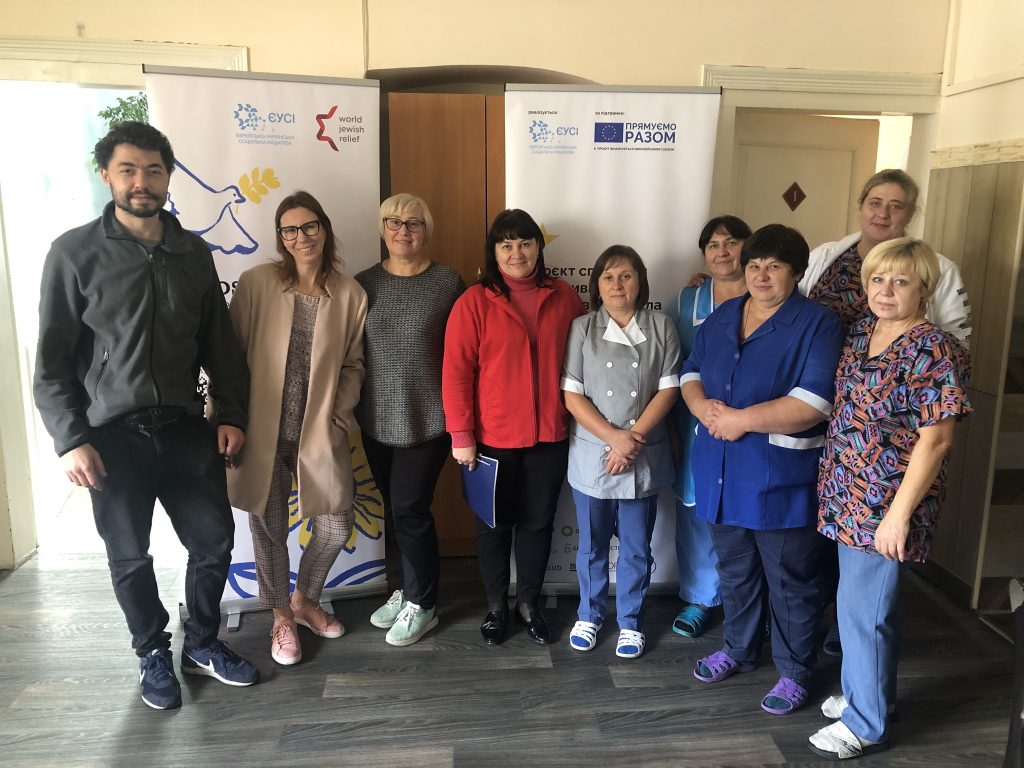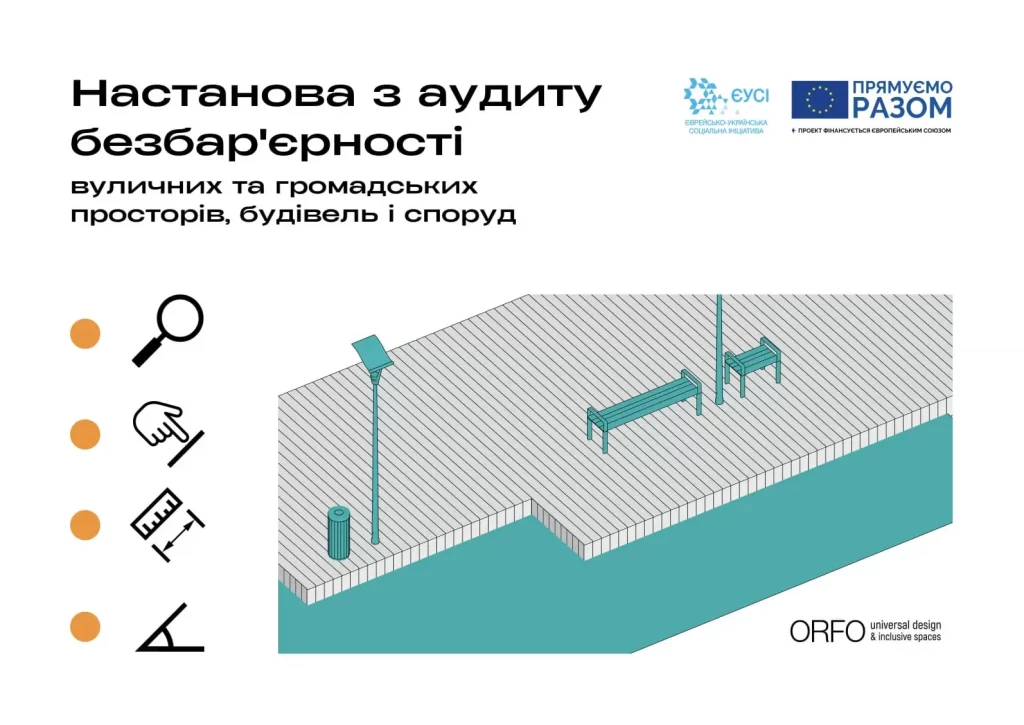 As of January 2023, the International Organisation for Migration (IOM) estimates 5.4 million IDPs are displaced across Ukraine, with approximately 25% of IDPs being children[1]. 25% of IDPs surveyed by IOM report one or more of their current household members have disabilities, and 40% reported having older persons[2] among their household members.
As of January 2023, the International Organisation for Migration (IOM) estimates 5.4 million IDPs are displaced across Ukraine, with approximately 25% of IDPs being children[1]. 25% of IDPs surveyed by IOM report one or more of their current household members have disabilities, and 40% reported having older persons[2] among their household members.
The Jewish-Ukrainian Social Initiative (JUSI) wanted to respond to the fact that most shelters and temporary housing locations for IDPs were poorly adapted to the specific needs of children, the people with mobility problems and people with disabilities and required substantial upgrades in terms of inclusion, accessibility and safety. With EU support, from June to November 2022, the JUSI team worked on improving the inclusivity and accessibility of shelters and housing for IDPs, and at the same time tried to ensure that when restoring and rebuilding destroyed residential properties and infrastructure, the new facilities would be barrier-free and designed with accessibility in mind.
With these two goals in mind, the JUSI team delivered 13 online sessions and educated over 900 Ukrainian volunteers, civil society leaders and local activists, as well as representatives of local self-government about the principles and practices of accessibility and inclusivity in housing and infrastructure design. A separate online session was dedicated to children’s playgrounds as the topic is particular connected to the mental and physical well-being, socialization and social integration of children. Bearing in mind that children form one of the largest groups that has been relocated, it seemed only reasonable to include a session focusing specifically on community-based spatial solutions for children’s integration, socialization and well-being, to which playgrounds contribute greatly. The online sessions were followed by 11 offline hands-on workshops engaging 113 persons working at or residing in shelters and/or temporary housing for IDPs in four oblasts to introduce small practical improvements to the design of shelters, temporary housing for IDPs and public spaces.
When implementing the action, the team found it essential to provide basic improvements to most of the locations covered by the action. It was important to create a sense of ownership towards the improvements within the local communities, so the action team directly engaged local staff, activists and IDPs themselves into practical activities and managed to improve the inclusivity of 7 shelters and temporary housing in Lviv, Rivne and Cherkassy oblasts, with 491 persons directly benefiting from the improvements, including at least 264 children, 103 older persons and 48 persons with disabilities.
 The EU-funded #StandWithUkraine action also provided a strong theoretical basis for inclusive improvements in Ukraine now and in the future. Developed materials on various aspects of inclusive, barrier-free and safety-oriented improvements of temporary housing for IDPs with focus on accessibility, low-cost and cost effective solutions create a comprehensive methodological and informational basis for decision-making and practical steps towards quality of life improvement for IDPs. The video lectures by top Ukrainian experts in the field of inclusion, universal design and accessibility altogether form an accessible and free educational course on spatial inclusion and barrier-free design for communities and IDP hosting facilities. These materials and video lectures offer high-quality self-learning opportunities for various interested audiences, irrespective of their professional background, experience or field of activity.
The EU-funded #StandWithUkraine action also provided a strong theoretical basis for inclusive improvements in Ukraine now and in the future. Developed materials on various aspects of inclusive, barrier-free and safety-oriented improvements of temporary housing for IDPs with focus on accessibility, low-cost and cost effective solutions create a comprehensive methodological and informational basis for decision-making and practical steps towards quality of life improvement for IDPs. The video lectures by top Ukrainian experts in the field of inclusion, universal design and accessibility altogether form an accessible and free educational course on spatial inclusion and barrier-free design for communities and IDP hosting facilities. These materials and video lectures offer high-quality self-learning opportunities for various interested audiences, irrespective of their professional background, experience or field of activity.
According to one of JUSI’s partners, Masha Foundation, the action’s practical component led to discussions among internally displaced parents about ways to adapt social infrastructure to the needs and expectations of families with children, taking into account the interests of children of different ages and the importance of such steps to increase the safety and convenience of the built environment. In its feedback the Foundation also emphasized the importance of raising awareness on inclusivity not only among representatives of state authorities and local self-government, but also among citizens themselves, enabling them to promote changes at the community level. The psychologists working with IDPs in Masha Foundation’s social rehabilitation projects stressed that the proposed practical activities, such as assembling children’s furniture once again demonstrated the power of simple, unpretentious and very local changes, which become a source of inspiration, promote awareness of barriers and discussion of ways to overcome them at the community level.
Background information:
The project “Facilitating the inclusivity and accessibility of shelters and housing for IDPs” is one of the initiatives supported by the European Union through our ‘Eastern Partnership Civil Society Facility project within the #StandWithUkraine Call launched on the 8th of April 2022, in response to the war in Ukraine. Through this Call we directly supported 14 initiatives, covering a wide range of topics: support to pregnant women during the war, support to IDPs in specific regions, first aid and safety trainings for volunteers and citizens, educational programmes for children, as well as support to preparatory work for economic recovery. In addition, 13 smaller scale initiatives were supported through the EaP Civil Society Fellowship programme. Find more about the results of the Call here and read the stories about other supported initiatives here.
[1] Here and further, a child is a person aged 0-17 years old
[2] Here and further, an older person is 60+ years old




